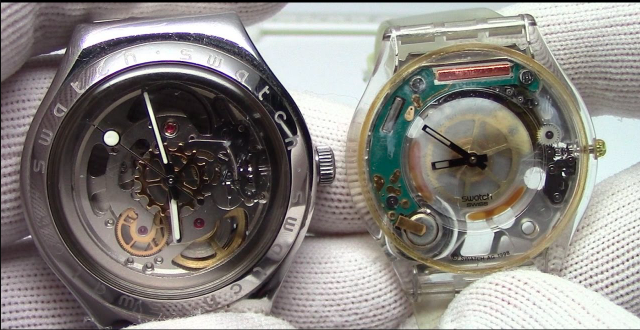Quartz vs. Mechanical: Understanding the Differences

When choosing a watch, one of the fundamental decisions is whether to go with a quartz or mechanical movement. Both types offer unique benefits and cater to different preferences. This guide delves into the key differences between quartz and mechanical mechanical vs quartz watch watches, helping you make an informed choice based on your needs and preferences.
1. Quartz Watches
Quartz watches utilize modern technology to keep time with high precision. Here’s an overview of their main characteristics:
Accuracy and Precision
Quartz watches are known for their exceptional accuracy. They use a quartz crystal that vibrates at a precise frequency when an electric current is applied. This vibration ensures that quartz watches maintain accurate timekeeping with minimal deviation. They are among the most reliable timekeeping mechanisms available, often deviating by just a few seconds per month.
Maintenance and Longevity
Quartz watches require minimal maintenance. The primary task is battery replacement, which usually happens every 1 to 5 years depending on the watch. Because quartz watches have fewer moving parts, there is less wear and tear compared to mechanical watches, reducing the need for regular servicing.
Affordability
Generally, quartz watches are more affordable than mechanical watches. The simpler technology and mass production of quartz movements lead to lower production costs, making them a more budget-friendly option. This affordability also means you can find a wide range of quartz watches across various price points.
Design and Features
Quartz watches come in diverse designs and styles. Many quartz watches feature digital displays, alarms, backlighting, and other advanced functions. This versatility makes quartz watches suitable for everyday use and various needs, from basic timekeeping to high-tech features.
2. Mechanical Watches
Mechanical watches represent the traditional approach to horology, relying on intricate craftsmanship and engineering. Here’s what sets them apart:
Craftsmanship and Artistry
Mechanical watches are celebrated for their craftsmanship and artistry. They are built with a complex system of gears, springs, and other components that require skilled assembly. The intricate design and manual labor involved in creating a mechanical watch often make it a piece of art, appreciated for its traditional value and engineering complexity.
Types of Mechanical Movements
Mechanical watches come in two types: manual and automatic. Manual mechanical watches require regular winding by the wearer to keep running. Automatic watches, however, wind themselves through the motion of the wearer’s wrist, offering a more convenient option for continuous operation.
read alos: 8 Innovative Digital Advertising Ideas for Hospitality Businesses
Longevity and Durability
Mechanical watches are known for their durability and potential for long-term use. With proper care and periodic servicing, a well-made mechanical watch can last for decades or even generations. The robustness of mechanical components allows them to endure a variety of conditions, though they require regular maintenance to ensure accuracy.
Power Reserve
Mechanical watches typically have a power reserve ranging from 24 to 72 hours, depending on the design and complexity of the movement. This is the duration the watch will continue to run after being fully wound. Some high-end mechanical watches feature extended power reserves.
Design and Aesthetics
Mechanical watches often feature elaborate and artistic designs. The complexity of the internal mechanics allows for intricate watchmaking and decorative elements, making them highly valued by enthusiasts and collectors who appreciate traditional craftsmanship.
3. Comparing Quartz and Mechanical Watches
Accuracy and Precision
Quartz watches excel in accuracy due to the precise vibrations of the quartz crystal. Mechanical watches, while generally accurate, can experience minor deviations due to the mechanical nature of their components. Regular servicing helps maintain the accuracy of mechanical watches.
Craftsmanship vs. Technology
Mechanical watches are prized for their artisanal craftsmanship and intricate design, reflecting traditional watchmaking techniques. Quartz watches focus on modern technology and functionality, providing reliable timekeeping with minimal effort.
Maintenance and Longevity
Quartz watches are low-maintenance, requiring only occasional battery replacements. Mechanical watches, on the other hand, require regular servicing to maintain optimal performance. Despite the higher maintenance needs, mechanical watches have the potential for greater longevity, often lasting for generations with proper care.
Cost and Value
Mechanical watches are typically more expensive due to the complexity of their movements and the craftsmanship involved. They are often considered luxury items and can hold significant value over time. Quartz watches are more affordable, offering excellent value for money in terms of accuracy and practicality.
Design and Features
Mechanical watches often feature elaborate designs and complex mechanisms, appealing to those who appreciate traditional craftsmanship. Quartz watches can vary from simple to feature-rich, including digital displays, alarms, and other advanced functions. High-end quartz watches can also offer sophisticated designs.
4. Making Your Choice
The decision between quartz and mechanical watches ultimately depends on your personal preferences and needs:
Quartz Watches:
- Ideal for those seeking high accuracy and low maintenance.
- Suitable for everyday use and budget-conscious consumers.
- Offers a range of modern features and versatile designs.
Mechanical Watches:
- Preferred for those who appreciate traditional craftsmanship and intricate design.
- Suitable for enthusiasts who value the art of watchmaking and are willing to invest in regular maintenance.
- Best for those who cherish long-lasting, artisanal timepieces.
5. Conclusion
Both quartz and mechanical watches offer distinct advantages and cater to different needs. Quartz watches are valued for their accuracy, low maintenance, and affordability, while mechanical watches are prized for their craftsmanship, artistry, and potential for long-term use. Understanding these differences helps you choose the right watch based on your preferences, lifestyle, and budget. Whether opting for the precision of quartz technology or the elegance of mechanical craftsmanship, each type of movement provides unique benefits in the world of horology.





